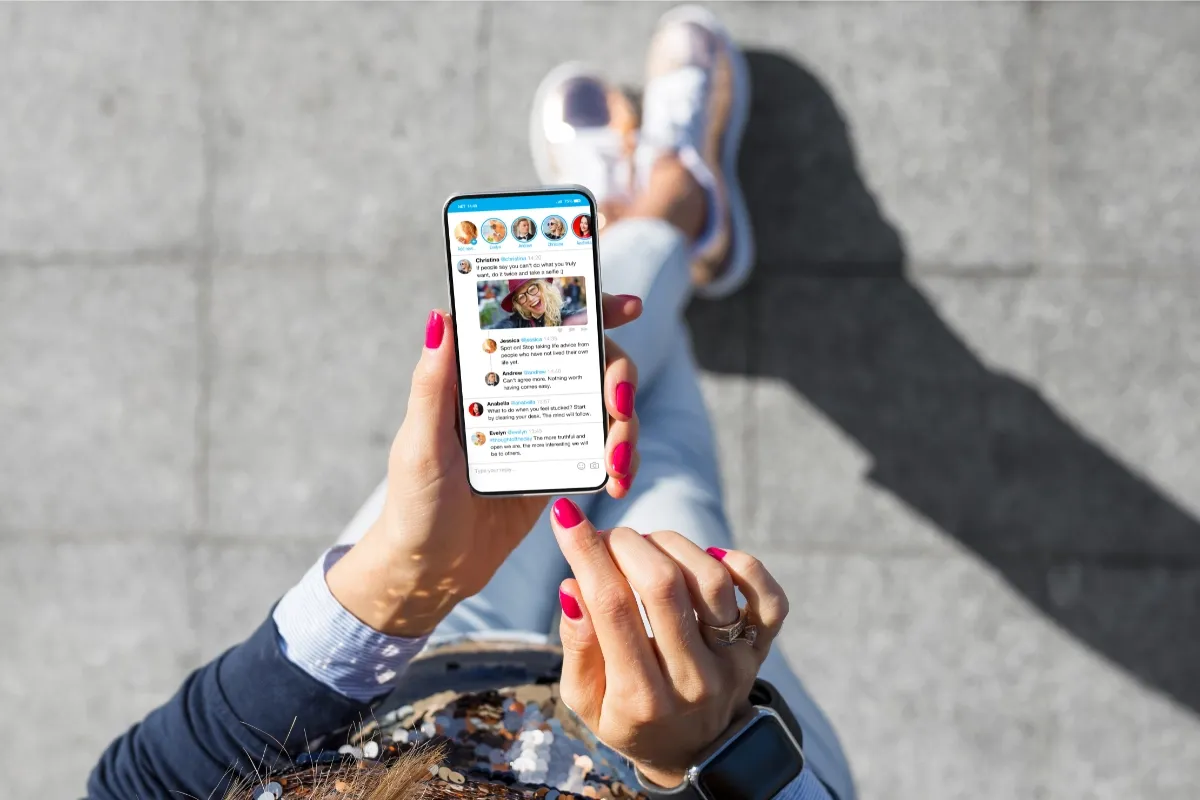
Social networks and relationships. How not to let the online world destroy them?
It’s enough to reach into your pocket and within seconds we have an appointment for lunch or call a friend for a holiday. No limited number of characters, no time restrictions. Social media helps us maintain and sometimes even find new relationships. But they can also make them pretty complicated. Comparisons, jealousy, addiction that disrupts our time together… How do we protect our relationships from the pitfalls of social media?
Why didn’t you respond to my message?
Social networks have made the way we communicate much faster. And that comes with a downside. Our loved ones often expect us to be available all the time. And not just them. If you’ve just started dating someone and you don’t write back for a few hours, they can take it personally. Even worse if you’ve read the message.
What about it? There are two options:
- Discuss it openly and establish boundaries for online communication. Not everyone feels at ease texting each other all day. And that’s fine. Try explaining your point of view and assuring the other person that it is not evidence of your (dis)love for them.
- If you didn’t get a chance to check in during the day, how about a phone call later? You’ll demonstrate your concern, get everything important said faster, and there won’t be any tension.
Calling more frequently will also keep you on the same page. It’s common for messages to be misinterpreted. People can’t see your face, but they can interpret emojis in their own way and notice how long it took you to respond. When calling, that is not an option.

Can we still meet in person?
Anyone who hasn’t met someone online should throw a stone. Many people claim they don’t have enough free time to continue meeting new people. It’s more effective to use Tinder or Instagram because you get to know more people.
That is undeniably correct. But we also make decisions based primarily on appearance and fall in love with the version of the person that they choose to share with the world. That’s why you should meet in person as soon as possible, if only for a quick coffee, to see if you’re a good fit. Of course, with extreme caution.

Tip: It’s also a good idea to write down what you want from your future partner. What characteristics he or she should have. It’s easier to determine whether a new internet acquaintance is truly a good fit for you, or if you’ve romanticized the online version of it.
4 ways not to let social networks interfere in our relationships
We can still maintain healthy dating and communication boundaries. However, networks have more serious pitfalls that can throw our relationships for a loop. A 2021 study discovered that spending more time on Instagram resulted in lower relationship satisfaction and higher rates of conflict. So, how can we protect our relationships from social media?
1. Avoid making comparisons
The unhealthy comparison of ourselves to all the beautiful and successful people on social media is already a hot topic. On the networks as well as in the mainstream media. However, few people discuss comparing themselves to their relationships or directly to their partners. Why doesn’t he surprise me with an exotic vacation for my birthday? Why aren’t we completely smitten? Why aren’t we more glitzy?
The truth is that many love videos are published, and what you see on social media is only a small portion of a partner’s life. So try not to compare yourself, your partner, or your entire relationship.
2. Think about whether your expectations are realistic
The counterpart can be the source of unrealistic expectations in a relationship. In short, they present themselves better on social media than they do in reality. She/he has more hair, a whiter smile, or even a healthier lifestyle – she/he is always at the gym on the internet, but in reality she/he has been posting pictures of one visit to the gym every week for a week. Then, after meeting her/him in person, disappointment sets in. So it pays to keep your expectations low.
However, all of the successful and often embellished people we see online can influence our expectations. We raise the imaginary bar so high that ordinary people in the offline world appear dull and inadequate.
So keep your feet on the ground and don’t accept the internet’s reality as the real one. Your expectations should be based on your own values and the real world.
3. Work with jealousy
Jealousy is a major issue in relationships that can be exacerbated by networks. You may become envious of people whose partners have responded to their content, wondering, “_What does he like about her that I don’t?_” Or conversely, at people who have responded to our partner’s content – “_Why is a work colleague commenting on her gym photo?_“.
There is only one solution. Let’s have an open discussion about it, and most importantly, let’s not do anything that would irritate our partner. Let us communicate our boundaries so that our partner understands how we feel, and let us trust each other. If jealousy is a major issue in your relationship, online couples therapy may be beneficial.

4. Don’t let networks steal your time together
You’ve agreed to meet for dinner, but as soon as the phone rings, it’s in your hand. What if you overlooked something? When you spend time together, you must give each other your undivided attention if you want to strengthen your relationship. If you’re tempted by notifications, disable them or uninstall the apps for a few hours. You’ll have them back in less than a minute.
However, it does not have to be about romantic relationships. Have you ever lamented the fact that you don’t have enough time for your friends and that you and your partner spend all of your free time at home? Check your phone’s statistics to see how much time you spend on social media each day. Consider how your life would be different if you spent half of it with the people you love.
How do you know if social networks are controlling you or you’re controlling them?
Our lives have become so intertwined with networking that it’s really hard to know when it’s too much. If you’re not sure yourself, here are some warning signs that networks are intruding too much into your life:
- When you wake up, the first thing you do is check your social media accounts.
- You’re still thinking about it even if you can’t be online for some reason.
- You prefer spending time online to spending time with family and friends.
- When you share a post, you eagerly await feedback every few minutes.
- The last thing you see before going to bed is social networking platforms.
- Because of the time you spend on social media, you frequently fail to keep up with your plans. Whether it’s for work or to get to a meeting on time.
Have you nodded your head a few times in agreement? You’re not alone if you feel like you’re losing control of your relationship with social media. Networking addictions, like any other, are difficult to overcome.
Have you considered going to therapy? An experienced therapist can assist you in regaining control of your networking in a safe and painless manner. So that they do not have a negative impact on not only your relationships but also your daily life.
You can easily join the therapy online with Hedepy in just a few minutes. We have over 100 certified therapists at our disposal and are happy to assist you in selecting the best one for you. Simply complete a five-minute questionnaire, and we will recommend three therapists to you.
Don’t face it alone
Finally, we would like to tell you the last and most important thing. It is completely natural to experience a wave of emotions in a difficult situation. Every crisis has its beginning, but it also has its end. Yours too. Therefore, if you are at least considering it even a tiny bit, ask for the help of a psychologist, psychiatrist, psychotherapist, or coach. Don’t face it alone; you can find help – At Hedepy.cz, there are more than 30 therapists. You can choose someone who is best suited to your needs, and make an appointment for the next day. You can then connect with the therapist online, from the comfort of your own home.Thinking about therapy?

My First Therapy: How to Prepare and What to Expect

What is psychotherapy? And who is it for?


